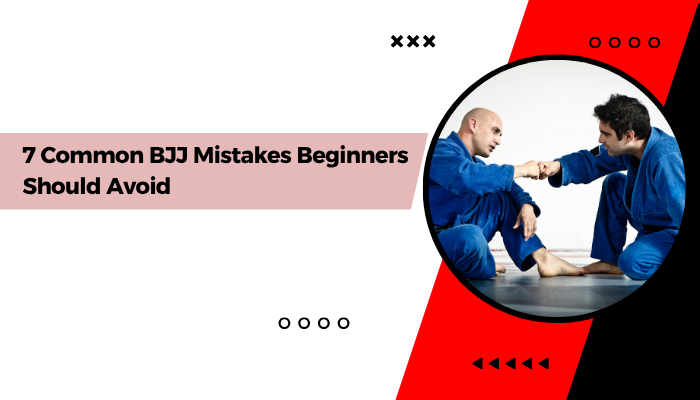Brazilian Jiu Jitsu (BJJ) is one of the most effective and respected martial arts in the world. With its emphasis on technique over strength, it’s an ideal discipline for people of all ages and sizes. Whether you’re looking to train for self-defense, fitness, or competition, BJJ offers life-changing benefits. And if you’re a parent seeking the best kids Brazilian Jiu Jitsu program, understanding the fundamentals- and common pitfalls- is essential to your child’s success on the mat.
But like any skill, progress in Brazilian Jiu Jitsu can be slowed or even derailed by early mistakes. Whether you’re new to the sport or watching your child navigate their first classes, knowing what not to do can be just as important as learning the techniques.
So let’s dive into the 7 common Brazilian Jiu Jitsu mistakes beginners should avoid– and how to get on the right path from day one.
1. Focusing on Strength Over Technique
One of the biggest mistakes new practitioners make is relying too heavily on muscle. It’s natural to want to overpower your training partner, especially when you’re rolling (sparring). But Brazilian Jiu Jitsu isn’t about brute force- it’s about leverage, timing, and precision.
Remember: smaller, less athletic practitioners often dominate because they understand the how of the technique better than the force behind it. Trust the process. In time, you’ll learn that proper mechanics will always outlast raw strength.
Tip: Ask your coach to review a technique with you if you’re unsure. Repetition and drilling will build the muscle memory you need.
2. Neglecting the Basics
It’s easy to get excited about flashy submissions like flying armbars or spinning heel hooks. But the truth? Mastery in Brazilian Jiu Jitsu comes from getting really good at the fundamentals- hip escapes, bridging, proper posture, and basic guard retention.
Skipping the basics creates gaps in your game. You’ll feel frustrated when those high-level moves fail because the foundation isn’t there.
Story time: I once saw a white belt attempt a flying triangle in their second week of training- only to land awkwardly and sit out for a month. Their coach? Not impressed.
Start simple, stay consistent, and the complex stuff will follow naturally.
3. Rolling Too Hard, Too Soon
Rolling (live sparring) is one of the most exhilarating aspects of BJJ. But beginners often make the mistake of going full throttle right away. Not only can this lead to injury, but it also prevents you from learning.
In Brazilian Jiu Jitsu, controlled rolling gives you space to try new things, assess positions, and develop timing. Going hard every round? That usually means reverting to instinct and strength, see mistake #1, and learning very little.
Tip: Ask higher belts to roll at a slower pace. They’ll often oblige and even offer feedback during the round.
4. Comparing Yourself to Others
It’s easy to glance around the gym and feel disheartened. Maybe someone with less time on the mat is progressing faster. Maybe your training partner taps you repeatedly.
But Brazilian Jiu Jitsu is a personal journey. Everyone learns differently. Some people train five times a week; others come once or twice. Some have a wrestling background; others are stepping on the mat for the first time.
Focus on your own progress. Celebrate small victories, like escaping mount or landing your first sweep. Those moments matter.
5. Skipping Warm-Ups and Drills
Let’s be honest, warm-ups can feel repetitive. Shrimping, forward rolls, breakfalls… again? But those foundational movements are crucial. They prep your body and reinforce mechanics used constantly in live scenarios.
Drilling might seem less exciting than rolling, but it’s the heart of improvement. Want to pull off a perfect triangle choke in a tournament? You’ve got to drill it thousands of times in training first.
Tip: Embrace the repetition. Think of each warm-up as sharpening your tools for the real action.
6. Ignoring Defense
Offense is fun, sure. Submissions look cool and earn respect. But you know what’s even more impressive? Someone who can defend against every attack thrown at them.
Many beginners focus so much on learning submissions that they neglect how to stay safe under pressure. Good defense allows you to stay calm, conserve energy, and wait for the right moment to counter.
Relatable scenario: You’re stuck under side control, your opponent’s weight pinning you down. Do you panic and thrash around? Or do you frame, create space, and recover guard? If you’ve drilled your defense, you’ll know what to do.
7. Not Asking Questions
You’re not expected to know everything. In fact, BJJ is so complex that even black belts continue learning every day. One of the best habits you can develop is asking thoughtful questions.
Don’t just nod along if you don’t understand a technique. Speak up. Ask your instructor why a grip is placed a certain way, or what to do if your opponent reacts differently.
Most coaches appreciate curiosity, it shows you care about getting better. And if you’re a parent looking for the best kids Brazilian Jiu Jitsu academy, look for one where instructors encourage questions and foster a positive learning environment.
Common Mistakes at a Glance
Here’s a quick recap of the most frequent Brazilian Jiu Jitsu mistakes:
- Over-relying on strength
- Skipping fundamental techniques
- Sparring too aggressively, too early
- Comparing your progress to others
- Ignoring warm-ups and drills
- Focusing only on offense
- Not engaging with instructors or peers
Why Avoiding These Mistakes Matters
Avoiding these mistakes isn’t just about improving faster, it’s about longevity. Brazilian Jiu Jitsu is often called “the gentle art” because it allows you to train for years without serious wear and tear, if practiced correctly.
But injuries from ego-driven rolls, frustration from stagnation, or burnout from unrealistic expectations? Those can derail even the most motivated student.
Take your time. Learn at your own pace. Stay consistent.
Click –propernewstime.com



